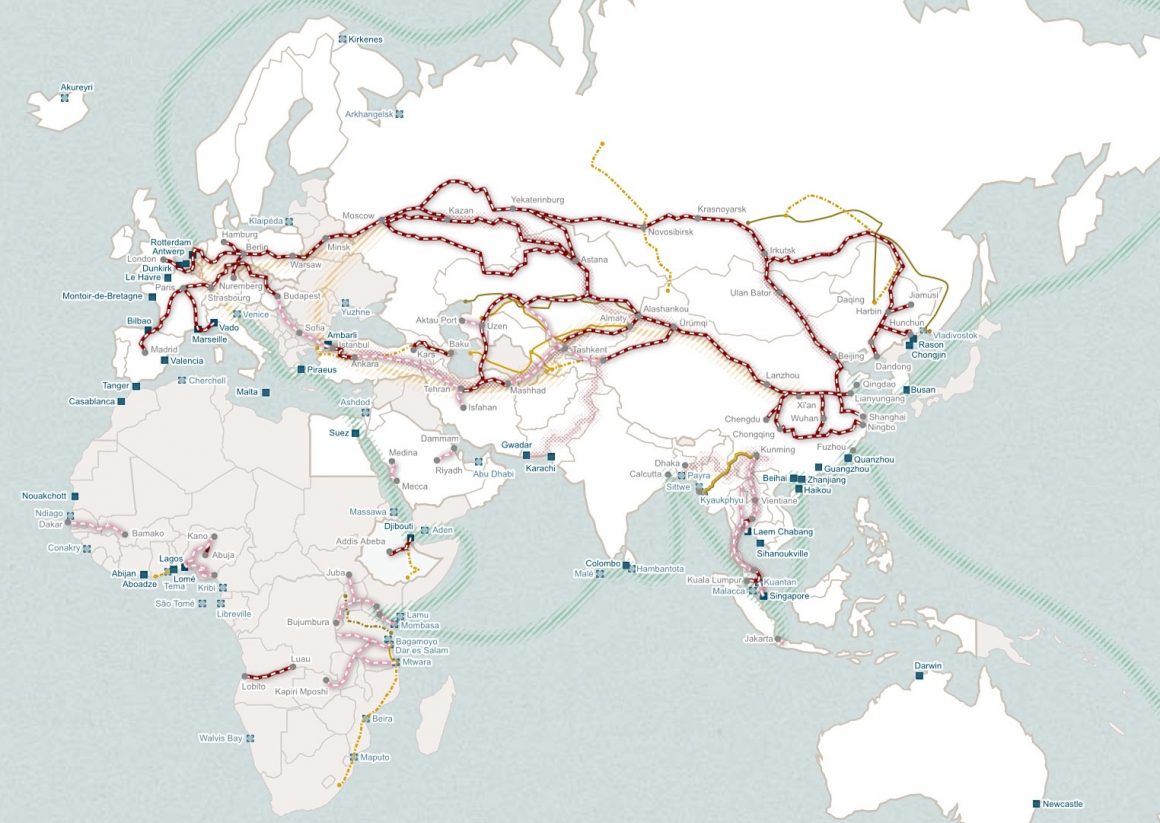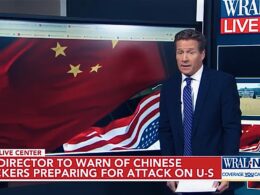Above: a MAP of China’s BRI
The mission of the imperialists is coming to be centered around dividing the peripheral and semi-peripheral countries; around preventing the rising Eurasian powers, and the neo-colonies across Africa, southeast Asia, and Latin America, from forming a singular force that can isolate western capital. With the recent maneuvers by countries like Mali and Burkina Faso to defy imperial control, this need to ruin the chances for a cooperative new global order is seen by the hegemon as more urgent than ever.
To prepare for when the hegemon starts carrying out acts of terroristic and economic sabotage against the Global South—a project that’s to go along with the eventual U.S. exit from Ukraine—the oldest and most decayed colonial powers are putting forth propaganda to portray such a collaborative future as impossible. The narrative they’re constructing is that BRICS is built on a fundamentally unstable foundation, making inevitable its failure to sufficiently assist the Global South. Hugo Dixon—the UK political operative whose career has mainly focused on defending the imperial asset the European Union—made an argument this week where he attempts to instill within BRICS supporters such a sense of futility:
The BRICS are now talking about adding new letters. The summit’s South African hosts say 22 countries have asked to join – and another 20 are interested. While no official list has been published, countries that have shown interest in the past range from Saudi Arabia, Argentina and Egypt to Iran, Cuba, and Kazakhstan. Developing countries are understandably resentful that rich countries haven’t addressed their needs. The United States and its allies have been guilty of breaking international norms, as in the invasion of Iraq, and of neglect, for example during the Covid-19 pandemic. But the Global South won’t get much from a club whose leading members are China, which is throwing its weight around in its region, and Russia, a near-pariah state. India and other emerging economies would do better to form their own non-aligned bloc.
Now that Biden’s attempt to shatter Russia via the Ukraine proxy war has failed; and the psyops behind this war have become unsustainable due to the revelations about Nord Stream and Kiev’s Nazi fighters; this is the only argument the hegemon’s narrative managers have. It’s the argument that even though we all know the U.S. government has proven itself to be a force for evil both abroad, and in relation to its own people, it’s comparatively the best option for the Global South to embrace as a helper. This is what’s implied within Dixon’s call for the peripheral countries to form a “non-aligned” bloc separate from China and Russia; because even if such a formation were to claim to be non-aligned, if it cut off Washington’s greatest rivals it by default would be a tool for the hegemon.
We’ll see if this policy proposal of Dixon’s also gets articulated by the officials who are to be facilitating the hybrid war on BRICS. If they try to convince the Global South to do this, they could build upon their existing strategy for trying to get the peripheries to side against the semi-peripheries. That strategy being Washington’s recent “trojan horse” ploy, where it maneuvered to prevent Russia from participating in a Ukraine peace meeting and thereby set up the other countries to look as if they’re in opposition towards Russia.
This manipulative scheme hasn’t actually changed the thinking or policies of these countries though, so Washington won’t be able to use their supposedly anti-Russian action as an argument for breaking from the Chinese bloc. You can’t hold somebody to their word when they never truly said what you wanted them to say; the out-of-context sentences spoken by Global South officials that the western media has been repeating, in which it’s construed to appear these officials are condemning Russia, simply don’t amount to what the hegemon wants them to. It’s a game where the manipulators attempt to twist reality, even if this won’t have a tangible effect on the great-power competition.
Consistent with this summer’s resurgence of old anti-Chinese media tropes, such as the Xinjiang genocide hoax, the primary narrative strategy the imperialists must now pivot to is discrediting China as a source for global leadership. When the narrative managers have to try to argue that China shouldn’t be a defining player in the Global South, as Dixon is, inevitably they say things that involve begging the question; insofar as it’s accurate to say that China is “throwing its weight around in its region,” why does this mean the Global South can’t expect to gain sufficient benefits out of a relationship with the PRC? Are we supposed to infer from this that China can’t be trusted to fulfill the needs of the Global South’s because its aim is supposedly to dominate and exploit? If so, Dixon can’t honestly try to support this argument by saying China is imperialist; like Russia and Iran, its global role is one of a semi-peripherial country, not of a core country.
Dixon also can’t argue that China, even if not an imperialist force, is still going to bring about a net negative outcome for the Global South. This has already been disproven by how, as observed by the musician Akon, China has done more for Africa than any other country; it’s the PRC that’s been building infrastructure which would never have been built if these countries had stayed loyal to the neo-colonial hegemon. And as the commentator Saikat Bhattacharya has concluded, the only thing that can come from this is these countries fully lifting themselves up from out of their forced underdevelopment; and then, as a consequence, the conditions emerging for a new wave of workers revolutions:
China never actually moved away from Marxist approach but changed course as time and material conditions changed. Under Xi, state companies will do more infrastructural investments often incurring losses. By 2035, the Communist Party of China has assessed that China will outcompete the USA not only in production but also in finance and military. It is then that socialism will be popular across the globe again. Following China, as different Third World countries will narrow per capita income gap and wage rate gap with imperialist countries, the capital’s bargaining power will reduce and working class bargaining power will rise considerably. Then working class revolutions will spring across the globe again. Belt Road Initiative is one way to develop the Third World quickly…Third World development will be followed by an increase in the power of the working class throughout the globe. Neoliberal globalization is already dying out and there is no strong political ideology strong enough to take the opportunity. Global communists must grasp the opportunity.
It’s this larger trend towards victory for the global working class which also ultimately discredits the most solid part of Dixon’s argument against BRICS: that because China and India are presently frenemies, China lacks hope to make BRICS into an effective tool for advancing its goals. Dixon names the ongoing disputes between these two countries as the reason behind why BRICS has experienced many delays in progress; and this is an obstacle towards China helping the Global South that’s undeniably real. Is the situation with India going to stay this way forever though? When you look at the collapse that India’s present productive system is experiencing, you see how fragile its leadership actually is. Bhattacharya talks about the hope for class struggle to defeat the country’s anti-Chinese fascist government:
Many military strategists suggest that Chinese navy can overrun the Indian Ocean by 2025. Thus the Indian ruling class is afraid that India cannot stand before the might of China aggravated by its religious and ethnic divisions. Therefore, the Hindutva fundamentalist regime under Narendra Modi (the BJP Party) was brought to power by the deep state, with the hope of its ultra-conservative and radical approach might ruthlessly suppress minority ethnicities and freedom-seeking nationalities to help India counter the rise of China…India is dominated by the cow belt politically, demographically and hence economically too. Thus non-cow belt ethnicities (significant minorities) are gradually feeling the heat of fascist politics incorporated by the fundamentalist regime of BJP. If communists can organise the national emancipation of non-cow belt ethnicities and use geopolitical rivalry of Indian ruling class, India is definitely an excellent place for a twenty-first-century revolution. The Communist movement is already strong in non-cow belt areas of Bengal, central Indian tribal areas and Kerala in the south. The Indian communist movements until now divided on the constitutional line and armed revolutionary line. But suppression by Hindutva fascist policies they may be compelled to unite.
The same is true about the Philippines, the other southeast Asian country Dixon points to as a source of opposition towards China: capitalist crises are intensifying within these places, and their governments are making the crises worse by deciding to partially fight against the transition towards multipolarity. When these crises reach the right degree, the revolutionary movements within these countries could triumph. The only reason Dixon says the present China-India-Philippines tensions are reason enough to abandon BRICS is because Dixon is invested in BRICS failing.
It’s totally plausible that by the end of this century, countries like India and the Philippines will be fully united with China after undergoing proletarian revolutions. But those seeking to discredit BRICS can’t entertain such a scenario. They don’t want to talk about the benefits that are already coming about from the world’s increasing friendliness towards China; and they certainly don’t want the peoples of the peripheral countries to get hope for workers victory. They want the global discourse to only focus on the negatives when it comes to BRICS; to dissuade all from imagining what incredible outcomes could be at the end of the multipolar trend which BRICS is furthering. This is how they hope to effectively re-colonize the formerly colonized world: through the lie that things can only look bleak for the Global South, unless it reaffirms its dependence on the imperial masters.
After all the good the BRI has so far done, what possible argument could they use to try to make this lie look believable? The argument they’ve decided on is that Washington’s leadership is essential for saving the planet from global warming. Even though Dixon’s Labour Party has in its words taken the “green growth” stance, in the long term, the terminally contracting capitalist order can only embrace a “degrowth” policy of eco-fascist austerity. One where the globe’s working class gets further strangulated, so that the bourgeoisie don’t have to give up their means for making profits.
This is a policy whose deceptive arguments Dixon repeats when he uses climate to make U.S. leadership appear indispensable: “Countries which see China as a threat, including India and the Philippines, have recently tilted towards the United States. But almost all developing countries can agree on two issues. They don’t want a new Cold War that would crush their growth opportunities. And they need help to decarbonise their economies rapidly and protect against the worst ravages of climate change. So they should be able to unite on keeping the global trading system open and ramping up flows of climate finance. But to do any of this, the club would have to exclude China and Russia.”
There’s another example of begging the question: why is excluding these countries a prerequisite for achieving those goals? Even if the U.S. imposes sanctions on the Global South countries in retaliation for their trading with China and Russia, as Dixon seems to imply could happen, China and Russia have already built a global trading system that’s an alternative to the one the imperialists control. As Pepe Escobar wrote this January: “The year 2023 will proceed with China playing the New Great Game deep inside, crafting a globalization 2.0 that is institutionally supported by a network encompassing BRI, BRICS+, the SCO, and with the help of its Russian strategic partner, the EAEU and OPEC+ too. No wonder the usual suspects are dazed and confused.”
The basis for the idea that the Global South can’t fulfill its climate goals while partnering with China is seemingly supported by how as a developing country, China lacks any obligation to distribute climate finances. It’s still not compelling enough of an argument though; the world doesn’t need the charity of neo-colonial exploiters in order to be able to reduce emissions. China is truly the thing that the world needs in this arena; Environment and Society Programme Senior Research Fellow Jiangwen Guo has concluded that “the international community needs to join forces to accelerate the deployment of renewables and China could play a critical role in doing this. China is the world’s most populous nation, has the second largest economy and is the largest emitter of greenhouse gas emissions, and as such, is fundamental to the success of any global agreements to tackle climate change.”
This is what the PRC and BRICS have to offer the world: a practical path towards a hopeful future, where peace, global cooperation, and the sharing of vital technologies get proliferated. Whatever the imperial powers and their propagandists say, all they have to offer is more war, more exploitation, and more false promises.
————————————————————————
If you appreciate my work, I hope you become a one-time or regular donor to my Patreon account. Like most of us, I’m feeling the economic pressures amid late-stage capitalism, and I need money to keep fighting for a new system that works for all of us. Go to my Patreon here.
To keep this platform effective amid the censorship against dissenting voices, join my Telegram channel.








